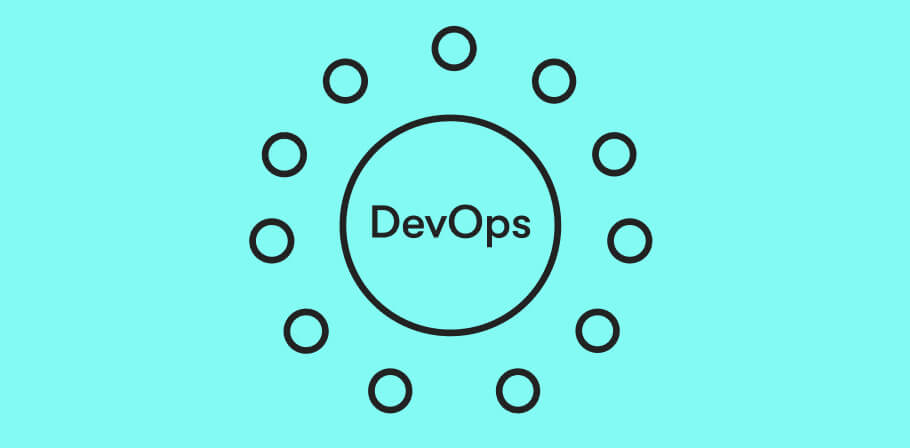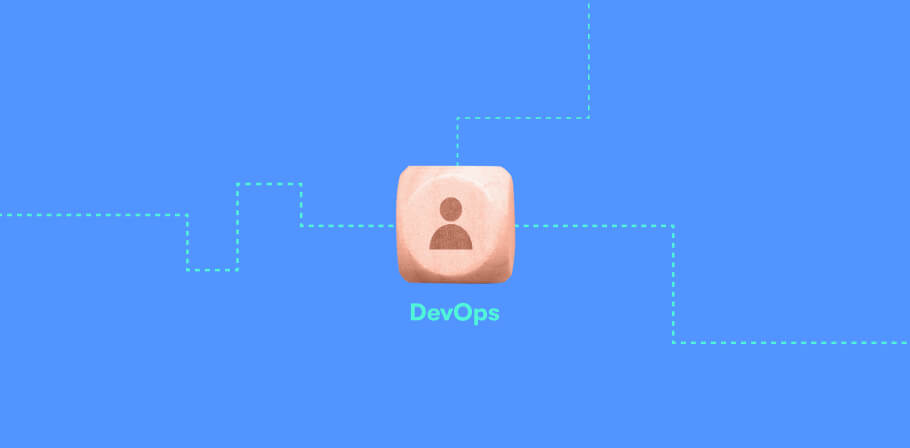A recent survey conducted by Harvard Business Analytics states that up to 70% of respondents mentioned DevOps as the key to increasing their speed to market, productivity, innovation, customer relevance, and service quality. This demonstrates the significance of applying this approach in software development.

Discover the pros and cons of DevOps outsourced services, its impact on the business workflow, and the major reasons to choose this method of collaboration. Read on for more!
What is DevOps outsourcing?
Businesses continually strive to accelerate their development processes while ensuring reliability and efficiency in their operations. DevOps, a portmanteau of "development" and "operations," has emerged as a transformative approach to achieve these objectives. However, for many organizations, implementing and managing DevOps practices in-house can be challenging due to various constraints, such as resource limitations, expertise gaps, and budget. This is where DevOps outsourcing comes into play.
Key components of DevOps outsourcing
- Infrastructure as Code (IaC): DevOps outsourcing often involves the implementation of IaC, where infrastructure configurations are managed programmatically using code. This approach enables rapid provisioning, scalability, and consistency across environments.
- Continuous Integration/Continuous Deployment (CI/CD): Outsourced DevOps teams set up and manage CI/CD pipelines to automate the build, test, and deployment processes. This ensures faster delivery of high-quality software releases with minimal manual intervention.
- Monitoring and alerting: Effective monitoring and alerting mechanisms are crucial for identifying and resolving issues promptly. DevOps outsourcing providers implement robust monitoring tools and practices to monitor system performance, detect anomalies, and trigger alerts for proactive maintenance.
- Security and compliance: Outsourced DevOps teams integrate security and compliance measures into the development pipeline to mitigate risks and ensure regulatory adherence. This includes implementing security controls, performing vulnerability assessments, and facilitating compliance audits.
- Cloud migration and management: Many organizations leverage DevOps outsourcing for seamless migration to cloud environments and efficient cloud infrastructure management. Outsourced teams optimize cloud resources, improve scalability, and enhance cost-effectiveness.
Why is DevOps important, and how does it contribute?
The global DevOps market reached $7 billion in 2021 and is expected to reach $26 billion by 2027, growing at a CAGR of 24.5%. This demonstrates that the adoption of DevOps is a growing concern among global companies because they start understanding its importance and benefits.

DevOps comes as a combination of multiple techniques and practices aimed to speed up the development of new products and simplify the maintenance of existing ones. However, the main contribution of this methodology is that it builds straightforward communication between development and operations teams.
This is achieved by applying the continuous delivery model, automating part of the workflow, and using collaboration platforms that keep the processes transparent. As a result, you get high-quality software faster and teamwork remains at top levels.
Why do successful companies choose DevOps outsourcing?
In software development and IT operations, adopting DevOps practices has become increasingly vital for businesses striving to remain competitive in today's fast-paced digital landscape. DevOps fosters collaboration, automation, and continuous improvement, enabling organizations to deliver high-quality software quickly and at scale. While many companies recognize the benefits of DevOps, not all possess the resources or expertise to implement and manage it effectively in-house. This is where DevOps outsourcing emerges as a strategic solution. Let's explore why companies leverage DevOps outsourcing:
- Access to specialized expertise: DevOps encompasses many tools, technologies, and methodologies, requiring specialized skills to implement and manage effectively. By outsourcing DevOps functions to experienced service providers, companies gain access to a diverse talent pool with expertise in Infrastructure as Code, Continuous Integration/Continuous Deployment (CI/CD), cloud technologies, and more. These specialists bring valuable insights and best practices honed through working with various clients across different industries, enabling companies to benefit from their knowledge and experience.
- Cost efficiency: Building and maintaining an in-house DevOps team can be a costly endeavor, requiring investments in recruitment, training, salaries, benefits, and infrastructure. DevOps outsourcing offers a cost-effective alternative, allowing companies to leverage external providers' services on a pay-as-you-go or subscription basis. This model eliminates the need for upfront capital expenditures and provides flexibility in scaling resources according to project requirements. Additionally, IT outsourcing providers may operate from regions with lower labor costs, further enhancing business cost savings.
- Focus on core competencies: For many companies, software development and innovation are core components of their business strategy. However, managing the intricacies of DevOps operations can divert valuable time and resources away from these core competencies. DevOps outsourcing enables companies to offload non-core tasks such as infrastructure management, deployment automation, and monitoring to external providers, allowing internal teams to concentrate on product development, customer engagement, and strategic initiatives. This focus on core competencies can drive greater efficiency and innovation within the organization.
- Scalability and flexibility: The dynamic nature of modern business demands agility and adaptability in IT operations. DevOps outsourcing offers scalability and flexibility to meet fluctuating demands and evolving business requirements. Whether scaling up to accommodate rapid growth or scaling down during periods of reduced activity, outsourcing providers can adjust resources and support levels accordingly. This scalability ensures that companies can maintain optimal performance and responsiveness without being constrained by internal resource limitations.
- Accelerated time to market: In today's competitive market landscape, speed is essential when delivering software products and updates to customers. DevOps outsourcing facilitates faster time to market by streamlining development processes, automating repetitive tasks, and optimizing workflows. Outsourcing providers leverage proven methodologies and best-in-class tools to expedite the software delivery lifecycle, enabling companies to rapidly release new features and enhancements while maintaining high quality and reliability.
Stages of DevOps workflow
Even when you outsource DevOps services, the workflow stages remain the same — a continuous cycle loops all processes until you reach the desired product quality.
1. Continuous Development
During the continuous development stage, your outsourced DevOps team is required to plan the project and start coding. All the requirements are received during a discussion with all stakeholders. It is a continuous and agile process because the developers are required to code whenever new features or performance issues appear.
2. Continuous Integration
The continuous integration phase is thought to be the most substantial in the whole workflow because it forces developers to update the code and implement new features frequently. Regular updates require testing after each new iteration to ensure software quality.
Although many tools are used for continuous integration, some of the most popular options include Jenkins, CircleCI, and Travis. They are used for build automation and testing.
3. Continuous Testing
All kinds of testing activities are applied before, during, and after integrating new modules. Bug-free software requires a lot of work from the quality assurance team, and an outsourced DevOps engineer would suggest using automation. It is a great way to reduce time and effort to deliver error-free applications.
Among the most frequent tools for continuous testing, we can point out Selenium, TestSigma, Eggplant, and others. They are applied for testing automation.
4. Continuous Monitoring
The goal of continuous monitoring is to find system errors like low memory or non-reachable servers. Your developers are supposed to detect these issues and fix them to ensure app performance remains high at all times. If the problem is critical, the team goes through the whole DevOps cycle to find a solution and other potential errors.
Some of the few tools used for continuous monitoring are Sensu, New Relic, and Splunk. These are used to observe metrics and track various activities in software.
5. Continuous Feedback
Gathering feedback through surveys or social media is a great way to get a fresh insight into how your software works from a user’s standpoint. Outsourcing DevOps professionals can help you get a structured approach to receiving and processing feedback from various channels to build a general image of what’s going on and what to improve.
From simple Google Forms for targeted surveys to analytics tools like Pendo, there are dozens of tools for working with feedback.
6. Continuous Deployment
The continuous deployment phase is also critical because it is all about deploying the final code on the servers. Among the elements of DevOps are configuration management (which ensures the deployment goes smoothly) and containerization (to support consistency in all environments).
Companies use tools like Chef or Ansible to manage the configuration during deployment, while solutions like Docker are more of an addition to support the stage’s scalability. There are many other open-source tools suitable for all kinds of needs.
7. Continuous Operations
The final stage, continuous operations, is focused on minimizing the downtime during maintenance. Downtime may cost companies about $5,600 per minute, reaching a total of $300,000+ per hour. That’s why a company that outsources DevOps would use a solution that eliminates downtimes and ensures the app’s services are always available.
Usually, tools such as Docker and Kubernetes are used for container management to save time and money, and ensure your company’s application is available faster.
OPTIMIZE DEVELOPMENT OPERATIONS WITH US
DevOps roles and responsibilities
An outsourced DevOps developer has multiple responsibilities, which vary in each project. Commonly, one could state that this specialist works on unifying and automating processes to provide a faster development process with higher quality. Let’s have a deeper look.
1. CI/CD Pipelines Support
An outsourced DevOps programmer must design, build, test, and maintain the continuous integration and delivery pipelines. This specialist also chooses the tools.
The CI/CD pipelines enable companies to deploy code frequently and enable continuous improvement. It is an everlasting loop that only ends when the desired quality is achieved, and the DevOps engineer sets these standards.
2. Customer-team coordination
A DevOps engineer must understand the project’s requirements from the customer’s side and which KPIs to use when estimating the results. The role also assumes that the specialist manages stakeholders and acts as a medium in discussions, ensuring both sides understand each other.
The engineer’s task is to keep the communication clear and coordinate both parties, acting as a project manager to some degree. Good soft skills ensure everyone remains satisfied with the collaboration.
3. Vulnerability assessment and risk management
As security is one of the cornerstones of modern software, regular vulnerability assessment is a must. A DevOps engineer must apply cybersecurity measures and manage risks that might occur with the software. Preventing a potential threat is a top priority.
4. Other tasks
A DevOps engineer covers dozens of responsibilities that vary with each project. Some of them may include:
- Consulting;
- Team mentoring;
- Code review and validation;
- DevOps culture implementation, and others.
However, a lot depends on the project and its requirements.
Reasons to outsource DevOps for your project
86% of organizations actively and passively promote DevOps practices. Startups often look for ways of pushing their solutions to the market faster, so collaborating with a DevOps outsourcing company is the best choice.
Outsourcing from a trusted partner like EPAM Startups & SMBs Global’s verified talent engagement platform allows your company to find talented engineers from all over the world. Also, this brings a flexible pricing model that isn’t always tied to a salary, unlike with most in-house employees. You get many benefits — read about them below.
Comparing outsourcing vs. hiring DevOps engineers
The role of DevOps has become increasingly crucial. DevOps engineers are pivotal in bridging the gap between development and operations, ensuring smooth software delivery and infrastructure management. Also, DevOps costs may vary depending on your organization’s needs, with yearly costs averaging between $80,000 and $350,000. However, organizations often need help deciding whether to outsource DevOps services or build an in-house team from scratch.
The following figures are based on the average market benchmarks as of 2024:
| Criteria | Outsourcing DevOps | Hiring DevOps in-house |
| Initial investment (avg.) | - | $150,000 |
| Annual cost (avg.) | $100,000 | $200,000 |
| Annual salary budget (avg.) | - | $200,000 |
| Expertise and experience | High | Variable |
| Cost efficiency | Lower upfront costs, long-term savings | High initial investment, potential long-term savings |
| Scalability | Easily scalable | Requires vast resources to recruit and train |
| Control and integration | Self-sufficient | Full control, gradual integration |
| Investment in talent | Low/none | Significant |
Outsourcing DevOps services
Outsourcing DevOps services involves hiring a third-party provider or contracting a specialized DevOps team to handle your organization's infrastructure and deployment needs.
- Expertise and experience: Outsourced DevOps teams often bring a wealth of experience from working with various clients across different industries. They are well-versed in implementing best practices and can offer innovative solutions to optimize your development pipeline.
- Cost efficiency: While outsourcing DevOps services may seem expensive initially, it can be cost-effective in the long run. You can avoid overhead costs associated with hiring and training an in-house team and infrastructure maintenance and upgrade expenses.
- Scalability: Outsourced DevOps teams can quickly scale their resources according to your organization's needs. Whether launching a new project or experiencing a surge in traffic, you can rely on your outsourcing partner to adapt to changing requirements efficiently.
Hiring DevOps in-house
Building an in-house DevOps team involves recruiting and training individuals specializing in development, operations, and automation.
- Control and integration: An in-house DevOps team allows greater control over your development processes and infrastructure. You can tailor workflows and tools to align seamlessly with your organization's requirements.
- Cultural fit: Hiring DevOps engineers internally enables you to foster a company culture that values collaboration, innovation, and continuous improvement. Building a cohesive team that aligns with your organization's values can contribute to long-term success and employee satisfaction.
- Investment in talent: Investing in hiring and nurturing talent internally can lead to a team that is deeply committed to your organization's success. With the right training and development opportunities, your in-house DevOps team can become a valuable asset capable of driving innovation and efficiency.
Pros & cons of DevOps outsourcing
Following the research conducted in the State of DevOps Report, it is believed that companies that outsource DevOps get 24 times faster failure recovery, 22% less time spent on unplanned work, and 3 times fewer change rate failures.
Apart from that, there are dozens of points to be covered. We have chosen the most prominent options to provide a general overview of the pros and cons.
Pros
- Global talent pool
Access to the global talent pool is among the biggest benefits of working with DevOps engineers via the outsource model. While finding an in-house specialist may be challenging, broadening the hiring market to the global level lets you find the right expertise from any country. This simplifies the recruiting process and provides you with richer options.
- Shorter development cycles
When collaborating with a consulting/outsourcing agency, companies get the full benefits of top-level DevOps expertise. This involves effective and transparent communication, consulting, automation of most processes, and the continuous evolution of your product. Hired engineers apply the best practices from the first moment of collaboration, so the standard development process becomes significantly faster.
- Cost-efficient solutions
DevOps aims at automating most processes which, as a result, saves your time and money. Development teams can focus on more important tasks while monotonous activities get scripted. Also, working with an outsourced DevOps engineer provides your company with a flexible pricing model, which is usually much cheaper than hiring an in-house expert.
- Higher quality and flexibility
As DevOps applies the continuous model, it is less likely that any bugs and errors slip through without being noticed. Potential issues are mostly cut down during the testing and monitoring stages, ensuring your company gets a solution with maximum performance.
- Better risk management
Outsourced DevOps engineers typically have rich backgrounds in the industries you need, so they already know how things work here. Experienced engineers apply the best DevOps practices to mitigate risks and deal with challenges before they even appear on the horizon.
Cons
- Work model restructuring
Applying DevOps in your startup requires a noticeable cultural shift, as it changes the ways people are used to working. Instead of keeping the project-based models, your team members will have to focus on the product-centric full-lifecycle models. These require making different teams work together toward a single goal. It’s quite a challenge, especially in conservative environments which lack leadership skills.
- Requires technical knowledge
Cooperation with a DevOps team requires technical knowledge like CI/CD processes, infrastructure, testing tools, and other key points that are needed to set appropriate product requirements. You won’t be able to set the task and monitor the results unless you have the appropriate engineering expertise.
- Requires strong teamwork
Now, you can probably see that DevOps emphasizes strong collaboration between different team members. Everyone comes from various backgrounds, and making them work together is quite a challenge. Applying the DevOps culture step by step is what really helps here.
START YOUR DEVOPS SUCCESS JOURNEY
Why choose EPAM Startups & SMBs as your DevOps outsourcing partner
Choosing the right partner is the most significant step when implementing DevOps practices in your company. EPAM Startups & SMBs comes like an Uber Premium in the world of IT outsourcing services.
48 hours to start
Our team is ready to take on your project within 48 hours or less after we approve all developers, and sign the NDA and the contract. We know how important it is for startups to work as fast as possible while maintaining top-notch quality, and that’s what we do. It takes only 2 days to upscale or downsize your team so that you can adapt to the changing market. We value speed, flexibility, and quality combined.
Top-notch developers at your service
We screen, select, assess, and hire candidates for your project. EPAM covers the recruiting process completely, so you can get a ready-to-work programmer in 2–4 weeks. We don’t just sell a contact — we sell dedicated expertise. You will get the right experience for startups, medium, and large-sized businesses.
A perfect cultural fit
EPAM’s talent pool includes developers from all around the globe. That’s why we can provide you with an expert who works in your time zone. It doesn’t matter whether you are in the US, Canada, Australia, or Europe. We’ve always got a suitable choice. You get 360 degrees of control over the project as the team members provide regular updates and keep the development process transparent.
Summing up
Outsourcing DevOps is a practical choice for startups of any size, as this brings in top-level expertise at a reasonable cost from all over the world. Businesses can hugely benefit from hiring a DevOps outsourcing company remotely because they can get experts with the appropriate industry backgrounds and experiences using the best practices.
However, the biggest challenge is choosing a trusted DevOps outsourcing company for collaboration. Choosing a trusted technology partner is important to achieve the best code quality at a reasonable price with timely software delivery. EPAM Startups & SMBs can help you with that.
Outsource DevOps to EPAM Startups & SMBs
Unlock the expertise of our seasoned DevOps professionals tailored to your industry needs. Say goodbye to operational challenges and hello to optimized workflows and accelerated growth. Schedule a consultation today and take the first step towards maximizing the potential of your software projects.
FAQ

Expert digital communicator and editor providing insights and research-based guides for technology buyers globally.
Expert digital communicator and editor providing insights and research-based guides for technology buyers globally.
Explore our Editorial Policy to learn more about our standards for content creation.
read more






















